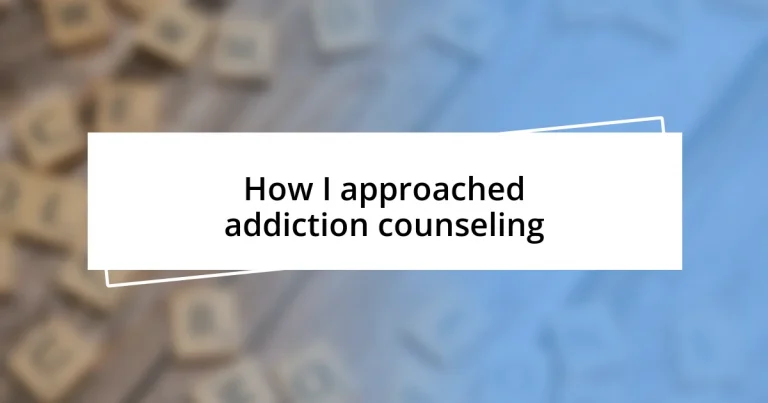Key takeaways:
- Empathy and a safe environment are crucial for effective addiction counseling, allowing clients to explore their emotions and personal motivations.
- Developing coping strategies and setting achievable goals are essential components of recovery, fostering self-awareness and building confidence through small victories.
- Establishing a strong support network and monitoring progress help individuals navigate setbacks, transforming them into opportunities for growth and reinforcing their journey toward healing.
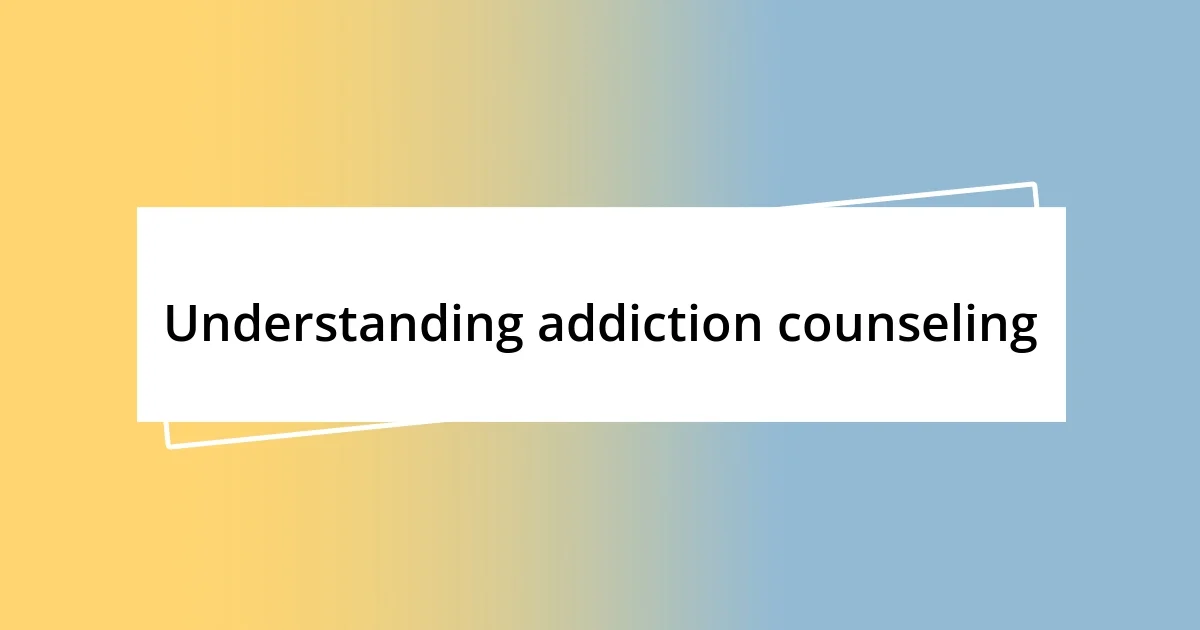
Understanding addiction counseling
Addiction counseling is a journey that involves more than just understanding substance use; it’s about exploring the emotional landscape behind it. I remember sitting across from a client who seemed lost and defeated, reflecting on how deeper issues like trauma and mental health often intertwine with addiction. This interplay makes the counseling process deeply personal and unique for each individual.
As I delved further into counseling approaches, I discovered that empathy plays a crucial role. Can you imagine how it feels to be truly heard for the first time? In my experience, when clients realize that someone is genuinely invested in their story, a sense of safety emerges. It’s in this environment that healing can truly begin.
Another critical aspect is creating a structured path for recovery. I often use cognitive-behavioral techniques to help clients recognize and change destructive patterns. Reflecting on my early days in counseling, I recall guiding someone who feared change. When they understood that every small step counted, their confidence blossomed, illuminating a powerful truth: change is possible, and it starts with understanding oneself.
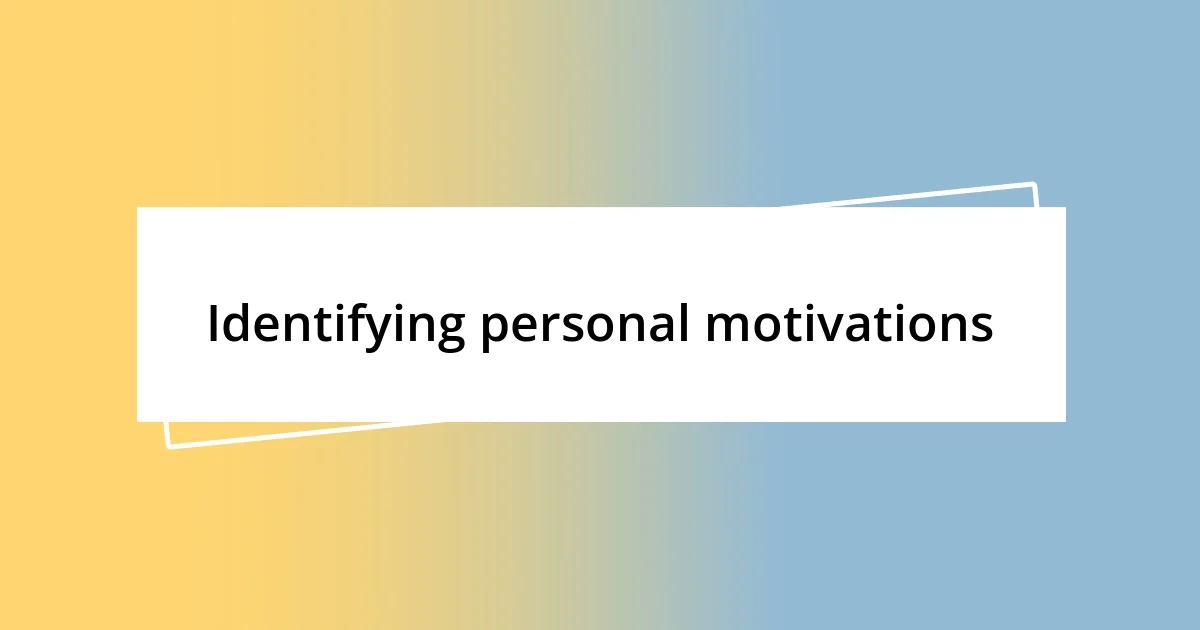
Identifying personal motivations
Identifying personal motivations is a crucial step in the counseling process. I remember when one client first shared their motivations for seeking help. At that moment, their eyes lit up with clarity—a mix of fear and hope. It struck me how powerful it is when someone connects their desire for change to their loved ones or personal dreams. Recognizing these motivations not only gives clients a reason to fight against addiction but also creates a roadmap for their recovery journey.
To dive deeper into identifying motivations, I often encourage clients to reflect on a few key points:
- What are the lasting impacts of addiction on my life and relationships?
- Who in my life do I want to be there for, and how can I improve those connections?
- What dreams and goals have I set aside while struggling with addiction?
- How does my self-worth factor into my desire to overcome these challenges?
- What changes do I hope to see in myself once I embark on this path?
These questions create an intimate dialogue that fosters self-discovery. In my experience, the more open clients are to exploring these areas, the stronger their motivation becomes, ultimately laying a solid foundation for their recovery.

Seeking professional guidance
Seeking professional guidance can be a pivotal moment in the journey toward recovery. I remember a client who initially resisted the idea of reaching out for help. Sitting with them, I sensed their fear, yet I also saw a flicker of hope when they agreed to take that first step. It’s a reminder of how important it is for individuals to recognize that seeking guidance doesn’t signal weakness; it’s actually a brave leap toward healing.
In my practice, I’ve observed that the relationship between counselor and client is essential. Imagine having someone who not only listens but understands the weight of your struggles. I often tell my clients, “You’re not alone in this.” Building trust takes time, but once established, it opens the door for profound revelations and a deeper understanding of one’s self. When I share my own experiences, it seems to create a bridge of connection—letting clients know that vulnerability is a shared human experience.
When considering professional guidance, it’s helpful to identify the various avenues available. Some may opt for group therapy, where camaraderie can blossom, while others prefer one-on-one sessions that offer a personalized approach. Reflecting on my early counseling days, being part of a support group drastically changed my perspective. The shared stories, the laughter, and even the tears foster a sense of community that can be incredibly healing.
| Approach | Description |
|---|---|
| Individual Counseling | One-on-one sessions that allow for personalized guidance and in-depth exploration of issues. |
| Group Therapy | Sessions with multiple individuals that create a sense of camaraderie and shared experiences. |
| Online Counseling | Virtual sessions that provide flexibility and access to professionals regardless of location. |
| Support Groups | Peer-led gatherings that offer empathy and understanding through shared experiences. |
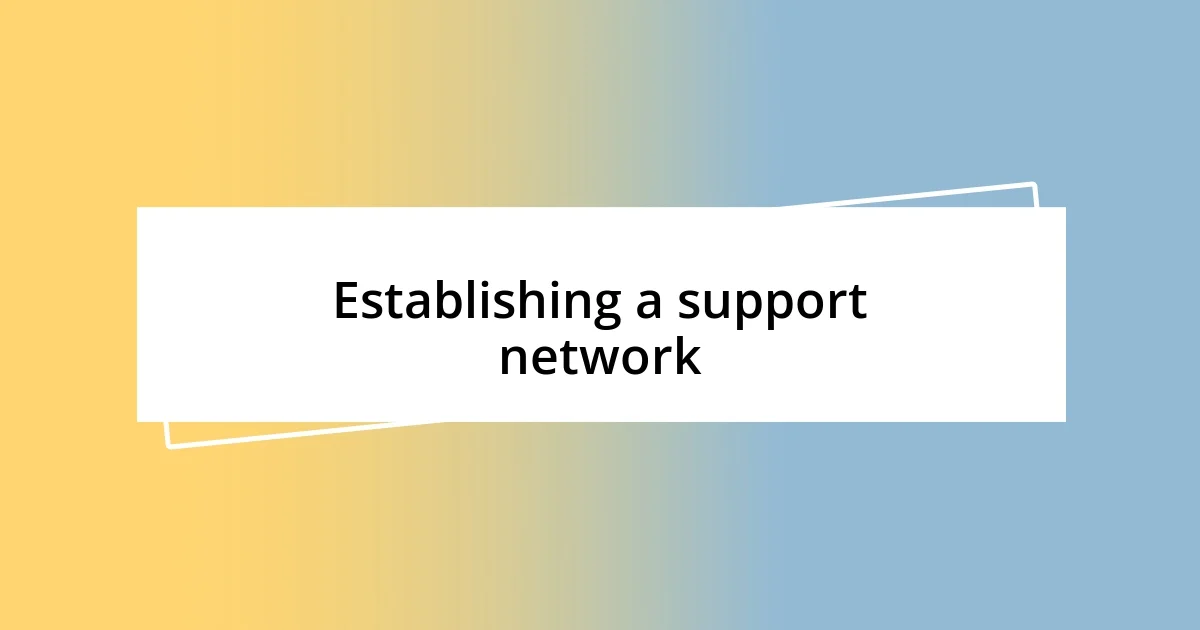
Establishing a support network
When I think about establishing a support network, I can’t help but recall a client who reached out to their friends after years of isolation due to addiction. The relief they felt after sharing their struggles was palpable. This experience drove home the point that vulnerability can be incredibly freeing. But I often wonder: how many people hesitate to connect with others because they fear judgment? It’s natural to worry, but in my experience, opening up tends to invite understanding and compassion.
Creating a solid support system means surrounding yourself with people who genuinely care and understand your journey. I once guided a client who formed a group with three friends who also faced their own challenges. They met weekly to share stories and encourage each other. Witnessing their growth was inspiring; they built a foundation of resilience through shared experiences. This made me realize that camaraderie isn’t just comforting—it can be transformative.
Pulling together a support network doesn’t happen overnight. In fact, I encourage clients to take small steps, like reaching out one person at a time. During one of our sessions, a client decided to call a family member they hadn’t spoken to in months, and the conversation was eye-opening. I’ve seen first-hand how even one positive connection can spark a change in attitude and motivation. Isn’t it remarkable how we often underestimate the healing power of simply being heard?
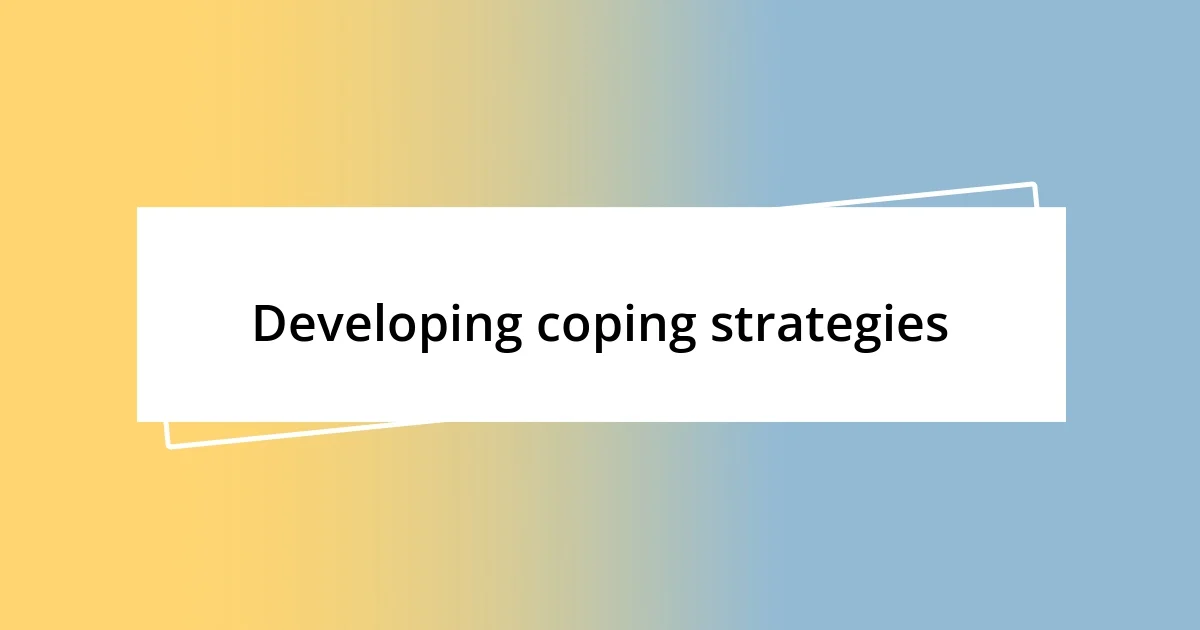
Developing coping strategies
Developing effective coping strategies is a cornerstone of recovery, and I’ve seen firsthand how this can transform lives. When I worked with a client who experienced overwhelming anxiety, we focused on mindfulness techniques. I vividly remember the day they first practiced deep breathing exercises. As they inhaled deeply and exhaled slowly, the look of calm that washed over their face was nothing short of inspiring. It made me realize how powerful simple strategies can be in navigating emotional storms.
Sometimes, I find myself pondering what specific coping mechanisms resonate most with individuals. For instance, creative outlets like painting or writing can serve as invaluable tools. A former client once shared how journaling became their refuge, allowing them to articulate feelings they struggled to express verbally. It’s interesting to think about how the act of putting pen to paper can act as a release, transforming chaotic thoughts into something tangible. Have you ever tried writing down your feelings? You might be surprised at the clarity it brings.
In my experience, the importance of consistency can’t be overstated. I had another client who committed to a daily routine of physical activity, whether it was a brisk walk or yoga. They described feeling lighter, both in body and spirit. The simple act of moving not only distracted them from cravings but also boosted their mood. It’s a reminder that coping strategies don’t have to be complicated; sometimes, the most effective ones are the simplest. What if we could all find joy in the little things, like a walk outdoors or creating art? I believe these small shifts can lead to monumental changes.
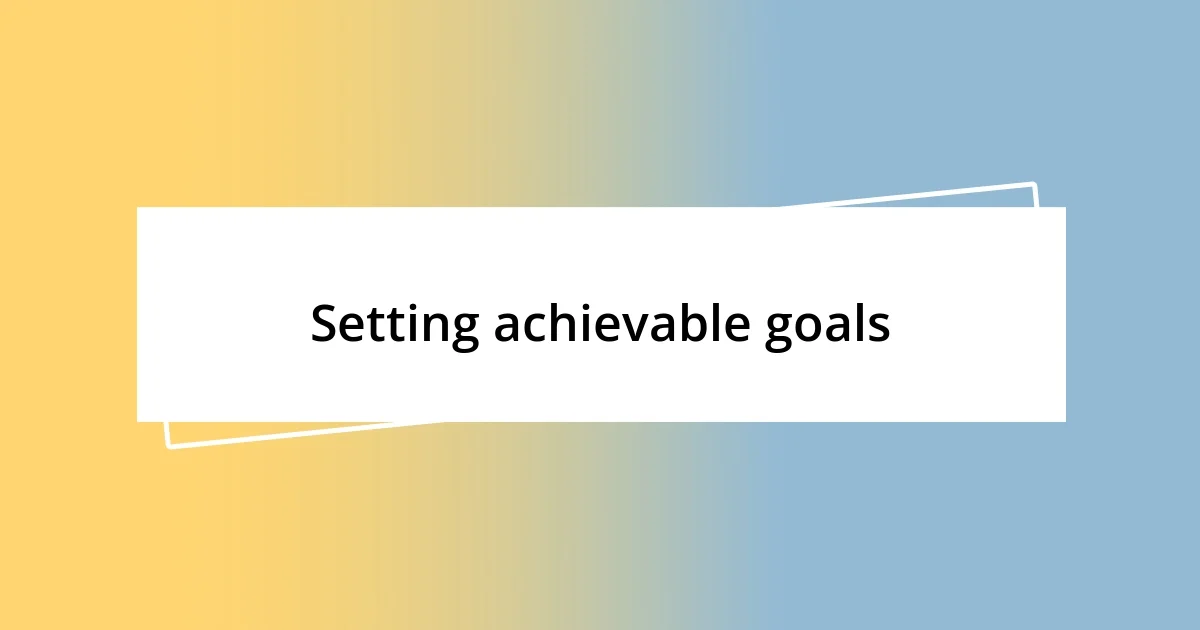
Setting achievable goals
Setting achievable goals is an essential part of the journey toward recovery. In working with clients, I often emphasize starting small. I recall one individual who decided to set a weekly goal of attending just one support group meeting. It felt manageable for them, and the sense of accomplishment after completing that goal opened the door to bigger aspirations. Doesn’t it feel good when we exceed our own expectations, even in small ways?
Sometimes, I suggest that clients use the SMART criteria—specific, measurable, achievable, relevant, and time-bound—while crafting their goals. I remember a client who wanted to reduce their substance use but felt overwhelmed by the end goal. Together, we broke it down: instead of aiming to quit entirely, they focused on decreasing usage gradually. This approach made it less daunting and more realistic. Who would have thought that small adjustments could lead to significant progress?
It’s fascinating how celebrating these small wins can impact a person’s motivation and self-esteem. I coached another client who created a simple chart to track their achievements. They found immense joy in marking each day they met their goal, no matter how small. I’ve seen firsthand how these little victories build momentum, reinforcing their commitment to a healthier lifestyle. Have you taken a moment to celebrate your accomplishments today? You might be surprised by how far you’ve come when you start to reflect on your journey.
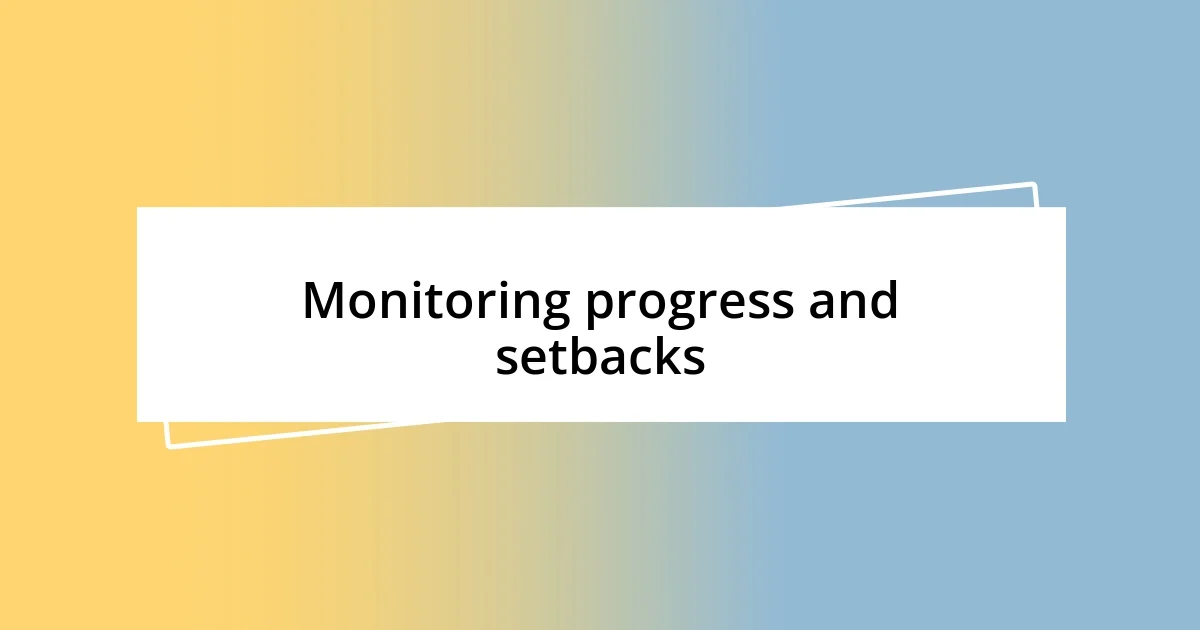
Monitoring progress and setbacks
Tracking progress and setbacks is a vital part of the recovery journey. I remember working with a client who felt disheartened by a slip-up after several weeks of steady progress. We spent time analyzing what led to that setback, exploring the triggers and emotions that surfaced during that moment. It was a heartening realization to see them transform their perception of setbacks not as failures but as opportunities for learning and growth. Have you ever thought about how a setback could actually guide you closer to your goals?
In my experience, a progress journal can be immensely helpful. I encouraged a client to document their daily thoughts and feelings, which proved to be an eye-opener for both of us. When they looked back at their entries, they noticed patterns that helped us tailor their coping strategies. It was like holding a mirror to their journey, reflecting not just the struggles but also the victories. How often do we take the time to reflect on our own experiences? I found that this form of introspection fosters self-awareness and empowers individuals in their recovery.
Celebrating milestones, no matter how small, deserves attention too. I recall organizing a small celebration for a client who reached the three-month mark of sobriety. The joy on their face was infectious, and it reminded me of how crucial it is to acknowledge progress, no matter the scale. It’s interesting to consider how these celebrations can form a supportive community around recovery. They reinforce the message that every step forward counts. What have you celebrated lately on your journey? Recognizing progress can instill a sense of accountability and excitement for what lies ahead.












